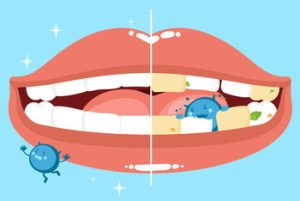We’ve all had moments where we’ve worried, “Does my breath smell?” Whether it’s first thing in the morning or after a meal with garlic, bad breath can be an uncomfortable issue to deal with. While it’s normal to experience bad breath from time to time, ongoing or recurring breath odour, known as halitosis, can be a sign of more serious issues related to your oral or general health.
In this blog, we’ll explore the leading bad breath causes, how to spot them, and what you can do to freshen things up, starting from brushing your teeth to making small but meaningful lifestyle changes. Let’s get into it.
What Exactly Is Halitosis?
Halitosis is the medical name for ongoing bad breath. Unlike occasional morning breath or the temporary smell from certain foods like garlic, it refers to a constant mouth odour that usually signals an underlying issue. It’s estimated to affect around one in four people and, if not addressed, can take a toll on your self-esteem and social interactions.
The #1 Culprit: Poor Oral Hygiene
A good oral hygiene routine should include:
- Brushing your teeth at least twice a day helps eliminate plaque and food particles, keeping your mouth clean and your breath fresh.
- Flossing daily to remove trapped food particles
- Cleaning your tongue using a tongue scraper or a toothbrush helps remove bacteria and debris that can cause bad breath.
- Rinsing with an antibacterial mouthwash
These simple steps can dramatically reduce mouth odour and help keep your mouth clean and healthy.
Dry Mouth: Less Saliva, More Bacteria
Saliva plays an important role in keeping your mouth clean by rinsing away food particles and neutralising harmful acids. When saliva production is low, bacteria can grow more quickly, resulting in bad breath. This condition is commonly known as dry mouth or xerostomia.
Dry mouth may result from:
- Dehydration or not drinking plenty of water
- Medication side effects
- Health conditions like diabetes
- Mouth breathing during sleep
- Smoking or using tobacco products
Combat dry mouth by sipping water regularly, chewing sugar-free gum, and speaking to your dentist if symptoms persist.
Food Choices Matter: Certain Foods That Affect Breath Smell
It’s no surprise that certain foods can cause bad breath. Garlic, onions, spices, coffee, and even canned fish can all leave behind strong odours that linger long after eating. These foods enter your bloodstream during digestion and are eventually expelled through your lungs when you breathe out.
While you don’t have to cut them out completely, rinsing your mouth or brushing your teeth after eating can help manage temporary bad breath.
Gum Disease: When Bad Breath Signals Something More Serious
Ongoing bad breath can also signal gum disease, a condition where plaque accumulates and triggers inflammation and infection in the gums. If not treated in time, it can lead to bone loss, shrinking gums, and deep pockets around the teeth, where bacteria can grow and multiply.
Symptoms may include:
- Swollen, bleeding gums
- A metallic taste in the mouth
- Loose teeth
- Persistent bad breath
If you notice any of these symptoms, it’s essential to visit your dentist. Gum disease can be managed with professional cleaning and improved oral hygiene, but early treatment is key.
Tonsil Stones and Foreign Bodies: Hidden Triggers of Mouth Odour
Similarly, a foreign body, such as a piece of food stuck between teeth or under the gums, can create a breeding ground for bacteria. Using dental floss daily and scheduling regular check-ups can help prevent and identify these issues early.
Health Conditions That Affect Breath
Sometimes, bad breath, also called halitosis, is not caused by the mouth at all. It could be a symptom of a medical condition or health issue elsewhere in the body. Some of these include:
Gastroesophageal reflux disease (GERD): Stomach acids can flow back into the throat and mouth, leading to sour breath.
Postnasal drip: Mucus dripping from the nose into the throat feeds bacteria that cause mouth odour.
Liver or kidney problems: These conditions can release chemicals into the breath.
Diabetes: High blood sugar or diabetic ketoacidosis may result in a fruity or acetone-like breath smell.
Sinus infections or mouth sores: These can also contribute to bad odours from the mouth or throat.
If your bad breath persists despite maintaining proper oral hygiene, it’s important to consult a healthcare professional to check for any underlying health conditions.
Lifestyle Habits That Make Breath Worse
Your daily choices may also be playing a role in your breath odour. Consider whether you:
Smoke or use tobacco products: These not only dry out your mouth but also increase the risk of gum disease and oral cancer.
Drink alcohol frequently: Alcohol dries out your mouth and encourages bacteria to flourish.
Skip meals: Not eating regularly can reduce saliva flow and lead to bad breath.
Neglect your dental visits: Regular visits to your general dentistry provider are crucial to maintaining your oral health and catching issues early.
Making small but consistent lifestyle changes, like quitting smoking, drinking more water, and seeing your dentist twice a year, can go a long way in improving your breath.
When to See a Dentist About Bad Breath
It’s time to talk to your dentist if:
- Your bad breath is constant and doesn’t improve with brushing or mouthwash
- You notice other symptoms like swollen gums, dry mouth, or pain
- You feel embarrassed or anxious about your breath in social settings
A dentist can determine what’s causing your bad breath and offer treatment for problems such as gum disease or tooth decay.
Final Thoughts: Fresh Breath Starts With Healthy Habits
Start with the basics: brush and floss daily, stay hydrated, use a tongue scraper, and keep up with regular dental check-ups. Fresh breath is not just about mints and mouthwash. It’s about a clean, well-cared-for mouth and a healthy body.
If you’re concerned about persistent bad breath, contact Available Dental Care at (02) 4062 8763 or (02) 4628 0573 to book a consultation and get the personalised care you need.
References
Mayo Clinic. Bad breath odor (halitosis): Symptoms and causes. Retrieved from https://www.mayoclinic.org/diseases-conditions/bad-breath/symptoms-causes/syc-20350922
Cleveland Clinic. Plaque build up: What is it and how to get rid of it. Retrieved from https://my.clevelandclinic.org/health/diseases/10953-plaque
NHS. Gum disease. Retrieved from https://www.nhs.uk/conditions/gum-disease/




